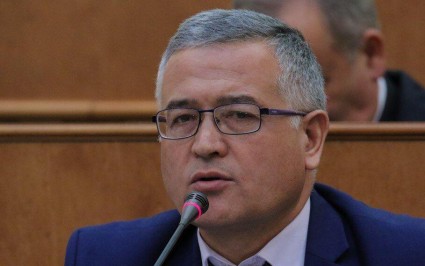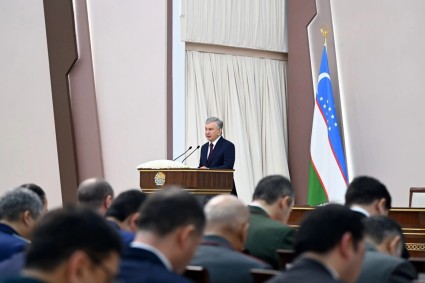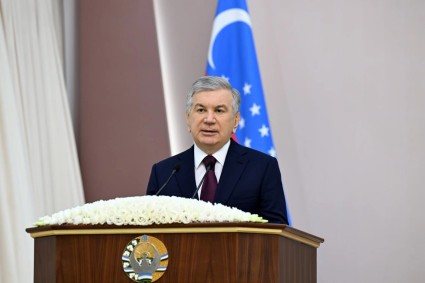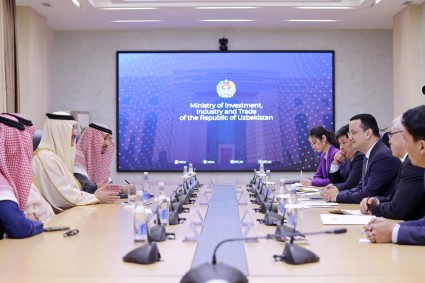Today the official project launch conference of the EU-funded project “EU-Tabassum: Media Skills to Promote Gender Equality and Empower Young Women in Uzbekistan” was held in Tashkent. There were more than 70 representatives from the Government of Uzbekistan, the Embassies of the EU Member States in Uzbekistan, NGOs, international and donor organisations as well as mass media companies of Uzbekistan.
The project is aimed to increase the expertise and practical skills regarding gender constructive reporting, gender disinformation and media campaigning of journalists, bloggers, youth and women’s CSOs, our target groups.
Women’s and youth NGOs will also receive grants up to 4,000 euros to create their own media messages and activities that reflect their perspectives and contribute to public discourse, fostering the narratives of youth and women in the Uzbek media. The project with the budget of 500,000 euros is funded by the European Union (EU) and co-supported by the German Federal Ministry for Economic Cooperation and Development (BMZ). It is implemented by DW Akademie, based in Germany, and the Modern Journalism Development Center (MJDC), based in Uzbekistan.
“The European Union stands with the women of Uzbekistan and supports their efforts towards equal rights and opportunities with men. Strengthening the capacity of NGOs in Uzbekistan and enhancing their ability to communicate important social issues to a broad audience is a significant step in this direction. We hope that this project will contribute to the development of a community that not only highlights important topics but also actively participates in solving social problems”, - said His Excellency Toivo Klaar, Ambassador of the European Union to Uzbekistan, in his welcoming speech.
“This is an extremely ambitious and vital for initiative for Uzbekistan. Even though the number of female participants in various public activities is always high,their ability to foster a discourse on gender, provide a female perspective, and participate in decision-making processes for good governance, are limited. Tabassum addresses gendered disinformation – a global trend also relevant to Uzbekistan. This form of online gender-based abuse often forces women to avoid digital public spaces and to withdraw from any active public participation. We want the young women to learn how to recognize and counter gender-based disinformation, added Ms Amalia Oganjanyan, DW Akademie Project Director.
“Tabassum in Uzbek means a smile. It is also a beautiful female name. We called our project “EU-Tabassum” to change the negative connotation in the coverage of gender issues in Uzbekistan to a positive and creative one. We strive to improve gender literacy of journalists and bloggers, also strengthening their constructive gender reporting capacities, to support women’s CSOs to advocate more effectively for gender equality and women’s empowerment and tackle outdated gender stereotypes, which hinders the promotion of women’s rights and the fight against gender violence in our country. We are confident that our project will make a significant contribution to building a more just and inclusive society”, - said Ms Saida Sulaymanova, MJDC Project Director.
The European Union is an economic and political union of 27 European countries. It is founded on the values of respect for human dignity, freedom, democracy, equality, the rule of law and respect for human rights, including the rights of persons belonging to minorities. It acts globally to promote sustainable development of societies, environment and economies, so that everyone can benefit.
DW Akademie is Deutsche Welle's center for international media development, journalism training and knowledge transfer. Its projects strengthen the human right to freedom of expression and unhindered access to information. DW Akademie empowers people worldwide to make independent decisions based on reliable facts and constructive dialogue. DW Akademie is a strategic partner of the German Federal Ministry for Economic Cooperation and Development. It also receives funding from the Federal Foreign Office and the European Union and is active in around 70 developing countries and emerging economies.
MJDC was founded in Tashkent in 2018 and is one of the leading media development NGOs in Uzbekistan and all of Central Asia. Its goals are to promote freedom of expression and the sustainability of the media in Uzbekistan. This is done through advocacy, media monitoring, promotion of standards for quality journalism, media monitoring and capacity building in modern multimedia technologies, media management and media law. MJDC has gained profound expertise in promoting media literacy, fact-checking, climate / environmental reporting, and media research. Two organisations have successfully cooperated on media literacy, capacity-building programmes for media managers and journalists, and the development of community media in Uzbekistan since 2019.














